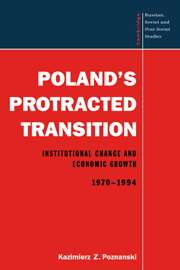Book contents
- Frontmatter
- Contents
- Preface
- Introduction: Research agenda, conceptual model and principal findings
- Part I Imperfect decentralization, broken political contracts and foreign-debt crisis
- Part II Economic reforms, divided society and ‘growth fatigue’
- Part III Communist legacy, ‘shock therapy’ and economic recession
- Appendix
- Notes
- References
- Index
- Titles in the series
Introduction: Research agenda, conceptual model and principal findings
Published online by Cambridge University Press: 29 October 2009
- Frontmatter
- Contents
- Preface
- Introduction: Research agenda, conceptual model and principal findings
- Part I Imperfect decentralization, broken political contracts and foreign-debt crisis
- Part II Economic reforms, divided society and ‘growth fatigue’
- Part III Communist legacy, ‘shock therapy’ and economic recession
- Appendix
- Notes
- References
- Index
- Titles in the series
Summary
This book argues that the post-1970 period in Poland's economy has been characterized by the relatively slow, often inconsequential, disintegration of the planning regime and the parallel reemergence of capitalist markets. Much of this systemic transition has been brought about unintentionally by the communist leadership responding to a variety of pressures coming from a disaffected society. The mid-1989 negotiated relinquishment of political control by the communist party did not mark the end of this institutional transition, but it did accelerate it by opening additional avenues for reform. The lengthy, still unfinished, process of remaking the economic system has weakened the mechanisms of coordination and ownership structure through most of the period in question. This institutional deterioration in the dominant state (= public) sector is here found to be one of the main reasons for Poland's volatile pattern of economic development, marked, among other things, by severe crises in 1979–82 and 1989–91.
Our particular interest is in explaining the period between 1979 and 1991, when Poland's economy experienced severe imbalances, extensive aging, and no real growth. We consider this general condition one of the most intriguing features of the whole period studied and also one that distinguished Poland from the rest of the region. We call this phenomenon ‘growth fatigue’ to separate it from other types of economic adversities that are either cyclical or caused by external shocks (e.g., in bank credit supplies, commodity prices).
- Type
- Chapter
- Information
- Poland's Protracted TransitionInstitutional Change and Economic Growth, 1970–1994, pp. xi - xlPublisher: Cambridge University PressPrint publication year: 1997



